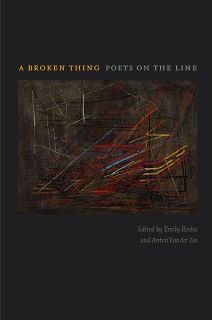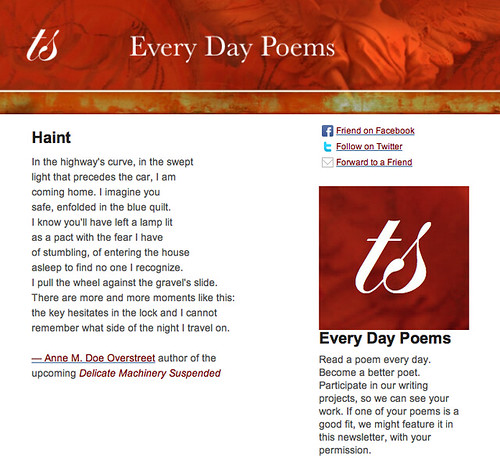I am tempted to review A Broken Thing: Poets on the Line, with a single line.
If I could do this, what line would I choose? Perhaps something from one of my recent stream-of-consciousness reflections…
Do the shells still hear the sea, though they are in pieces? How deep does the hearing of the sea enter into bone?
Either of these lines would say it all for me. Or be only a beginning. Either line would stand alone, yet it would beg to stand together with more thoughts, poured out from the wider stream, or sea, if you will.
This is the dilemma, or perhaps the dynamic, that the poets in A Broken Thing have addressed, wittingly or unwittingly: finiteness and the infinite, singularity and plurality, isolation and community. A line stands alone. But no, a line stands together with other lines and the poem as a whole. A line is a piece of the shell. But no, a line is the whole shell and it echoes the sea in which it first found its life. A line is a bone, compact and hard and bounding, but no, it has absorbed an eternity of salt-water that will not be confined.
If I seem to be wandering in poetic thoughts, when I am supposed to be reviewing a book, then this is an accurate and important appraisal, because A Broken Thing will do just this: make you think, and think again, and argue with yourself, and agree with (and then argue with) more than seventy poets, on the issue of the line in poetry. Like the sea, with its constant movement, your thoughts will ebb, flow, crash, eat away at shores and build them; you will need more than a day, or even a month, for this reality.
When I come across a book as provocative as A Broken Thing, I know I will recommend it, but the question is… to whom, and in what context. In the case of this book, I find myself asking who has the mental stamina, the philosophical bent, and the luxury of time to read and appreciate something this dense, thoughtful, and poetic. Surely not a student, unless that student is allowed to take a long time to pore over the words. It would be pure malice to assign this as a required text with a vigorous reading schedule. In the interest of finishing on time, the student would constantly need to fight the invitation to stop and consider…
By brief moments… a life can appear
The line… is a rebel thing
The line is telling, not only in what it says but what it doesn’t say
Her line cuts me out
I do believe that a poem is the sum of its lines
embroiled in the problem of the line was the problem of deciding
We don’t have time for the line
I want the line-break to tell me…where a speaker butts up against silence*
And so it continues, until you feel your mind might implode with the myriad thoughts that agitate and generate, foil and unfold. From dividing political assertions (the line is “a gendered and fascist reliquary containing the careers of Pound, Eliot…”) to unifying one-world assertions (“this connection of everything with lines”), you will find that you cannot settle in one place. And while you might find some good advice on how to construct a more effective line, you will not necessarily feel you’ve made any decision on the effect or nature of a line.
“The line in digital poetry is not broken”; Stephanie Strickland begins her essay with this line, somehow oddly embodying the dynamic with which we began. She makes an assertion in one direction—wholeness; yet, visually, her assertion contains a contradiction. One cannot help but notice: the claim stands so lonely at the top of the page. Ultimately, her opening holds the finite and the infinite in tension. It suggests singularity and plurality, isolation and community, all at once, if that were possible.
I could continue sharing from Strickland’s essay or from the book as a whole. I could go on. There are more lines worth quoting, more thoughts worth turning over in the palm. Yet this issue of making decisions, to trust in the finite—a seemingly bounded set of words—to say what is beyond, suddenly confronts me. I am back to my initial temptation: shall I say what I need to say here in a single line?
If the shells still hear the sea though they are in pieces, a single line might do.
____
*Quotes, in order of appearance, are from the following essayists in A Broken Thing: Kazim Ali, Marianne Boruch, Cynthia Hogue, Christine Hume, John O. Espinoza, Gabriel Gudding, Ibid, Cynthia Hogue. This is a reprint of a review of A Broken Thing: Poets on the Line, first published at Englewood Review of Books.
Post by L.L. Barkat. Visit L.L. at Emily D. Tea Traveler, for more on writing, poetry, and life.
___________
Buy a year of Every Day Poems, just $5.99— Read a poem a day, become a better poet. In February we’re exploring the theme Red.
- Learning by Poetry: Vous venez d’où? - September 1, 2025
- 5 Fun Ways to Play with Language! - August 18, 2025
- Poetry Prompt: In the Wild Secret Place - January 6, 2025



Maureen Doallas says
Somehow I missed this in ERB, so thank you for sharing it here. Sounds like a book I’d enjoy.
L. L. Barkat says
It’s a good read for you, yes. But it begs for time.
I am still going back and rereading parts 🙂
Karenee says
I’m adding this to my “someday read” list. It sounds beautiful!
L. L. Barkat says
Karenee, you might be able to get it through the library. It’s gotten some good press, so it might be available. 🙂
V.C. Sherman says
Being very analytical it seems that I would enjoy this read..if I can get through it. 🙂
L. L. Barkat says
I think you *would* like it. You’d just need to take your time with it. It’s that kind of book anyway, so you could feel perfectly fine about a slow-reading approach.
Elizabeth W. Marshall says
Having just read your article today in which this book was referenced, I am compelled to begin it this weekend. The only frightening thing is whether or not it is “for me”. 🙂 I may be the best one to determine that but my inquisitive side asks, would L.L. recommend it — to me.
L. L. Barkat says
Good question, Elizabeth.
If you are looking for an education in poetry, I highly recommend it. I’m not talking just craft but philosophy.
It is a slow read, because it is very thought-provoking, and each chapter kind of stands alone. But it could be part of an excellent “writer’s reading program,” of which I would recommend only a handful of books one should commit to reading to become a better writer or poet (and put the lesser stuff aside).
Elizabeth W. Marshall says
Well perhaps some of the others in the handful are available on kindle. Hard to say I don’t like it bc I do use it. Although I don’t like it. This title is not available instantly. Good for it. Maybe some others on your short list are. (Writer’s reading program) We have discussed scores of titles. I need a narrowing. Do you have 2 or 3 top picks in addition to A Broken Thing.
L. L. Barkat says
This is actually something I need to do for the sake of a program I want to develop here at Tweetspeak, that riffs off The Writing Life workshop (or, actually, includes it).
Let me think on it. 🙂 There are too many “must-reads” declared out there that are not must-reads at all.
Elizabeth W. Marshall says
Take your time. I have some writing to work on for some folks who have waited patiently for my submission.
Elizabeth W. Marshall says
I should clarify, we being the participants in The Writing Life workshop. Drowning in sea of good reads and resources. Want to select those which will feed, nuture “poet” me. 🙂